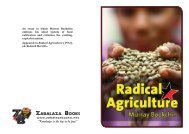smash-pacifism-zine
smash-pacifism-zine
smash-pacifism-zine
You also want an ePaper? Increase the reach of your titles
YUMPU automatically turns print PDFs into web optimized ePapers that Google loves.
John Lewis, the young president of the increasingly militant<br />
SNCC, planned to give at the Lincoln Memorial rally. The<br />
sentence that bothered Kennedy was "In good conscience,<br />
we cannot support the administration’s civil rights bill, for<br />
it is too little too late."[8] Primarily Lewis opposed the fact<br />
that the bill did not protect blacks from violence or<br />
guarantee the right to vote, but the statement seemed a clear<br />
denial of the link between the march and the Kennedy’s<br />
efforts to secure passage of this act. Others were offended<br />
by Lewis’s speech as well. The Roman Catholic Archbishop<br />
Patrick O’Boyle was troubled by the phrase, "Patience is a<br />
dirty and nasty word," and the militancy of the lines: "We<br />
will march through the South, through the heart of Dixie,<br />
the way Sherman did. We shall pursue our own ‘scorched<br />
earth’ policy and burn Jim Crow to the ground nonviolently."[9]<br />
A man who had worked tirelessly as a civil<br />
rights activist for many years, O’Boyle said that if the<br />
"Sherman" part wasn’t changed he wouldn’t deliver the<br />
invocation the next day.<br />
“(...)<br />
“By late morning on the day of the march, Lewis<br />
and several other SNCC leaders were huddled together with<br />
march leaders in a security guard’s office behind Lincoln’s<br />
statue still debating various edited revisions of the speech.<br />
At one point a last-minute version of<br />
the speech edited by the president<br />
himself was delivered by deputy<br />
attorney general, Burke Marshall, who<br />
had rushed over in the sidecar of a<br />
police motorcycle.”[10]<br />
This set off a heated debate<br />
that ended only with the elder,<br />
Randolph, pleading with Lewis and<br />
other SNCC members to tone down<br />
their speech:<br />
“Finally, perhaps to preserve<br />
the spirit of unity and out of respect<br />
for the long struggle of a venerable<br />
leader, a salvaged agreement was<br />
made. Despite the changes in<br />
wording, Lewis’s speech was the most<br />
militant of the day. Telling an audience<br />
who interrupted his speech with<br />
applause fourteen times that "the revolution is at hand," his<br />
strident, impassioned language was a harbinger of a<br />
separate movement to come.”[11]<br />
Four victims of Birmingham Bombing.<br />
Notes<br />
[1] Branch, Taylor. Parting the Waters: America in the<br />
King Years, 1954-63. New York: Simon and Schuster, 1988,<br />
p. 840.<br />
[2] Paula Pfeffer. A. Philip Randolph, Pioneer of the Civil<br />
Rights Movement, p. 244.<br />
[3] Ibid, p. 249.<br />
[4] Fairclough, Adam. Martin Luther King Jr. Athens,<br />
Georgia: The University of Georgia Press, 1995, p. 89.<br />
[5] Reeves, Richard. President Kennedy, Profile of Power.<br />
New York: Simon and Schuster, 1993, p. 581.<br />
[6] Hampton, Henry and Steve Fayer with Sarah Flynn.<br />
Voices of Freedom: An Oral History of the Civil Rights<br />
Movement from the 1950s Through the 1980s. New York:<br />
Bantam Books, 1990, p. 161.<br />
[7] Ibid.<br />
[8] Marable, Manning, and Leith Mullings, editors. Let<br />
Nobody Turn Us Around: Voices of Resistance, Reform, and<br />
Renewal. Lanham, Maryland: Rowman & Littlefield<br />
Publishers, Inc., 2000, p. 407.<br />
[9] Reeves, p. 581.<br />
[10] Branch, p. 878.<br />
[11] Branch, p. 880.<br />
* Randolph was a longtime organizer in the Black<br />
civil rights movement. He was the president of the<br />
Brotherhood of Sleeping Car Porters, a small but influential<br />
union. Randolph had extensive contacts with organized<br />
labour and business, and was critical in gaining support<br />
from organized labour for civil rights groups. He was also a<br />
“staunch anti-communist.”<br />
_________________________________________<br />
Birmingham Bombing,<br />
1963<br />
On September 15, 1963, just<br />
weeks after the March on<br />
Washington, a church in<br />
Birmingham, Alabama, was bombed.<br />
The target was the 16th St. Baptist<br />
Church, an organizing base for the<br />
civil rights movement in the city.<br />
The attack occurred six days after<br />
local schools were desegregated. The<br />
bomb killed four young girls (one<br />
was 11 years old, three were 14<br />
years old).<br />
As fireman and police arrived, a<br />
mob of Black youths gathered and<br />
began throwing rocks and bottles. In<br />
the clashes that followed, two more Black youth were<br />
killed, one by police and another by white youth.<br />
In the streets, armed white racists patrolled their<br />
neighbourhoods. King arrived that evening, secured in a<br />
'safe house' with armed bodyguards, demanding the<br />
deployment of federal troops from the Kennedy<br />
administration.<br />
Even at this time of outrage and sorrow, Kennedy<br />
still manoeuvred to dampen Black militancy, using the<br />
impending civil rights act as leverage:<br />
“He then asked King to help forestall further<br />
violent outbreaks and demonstrations. Kennedy said they<br />
could adversely affect the civil rights bill... 'Congress can't<br />
52



